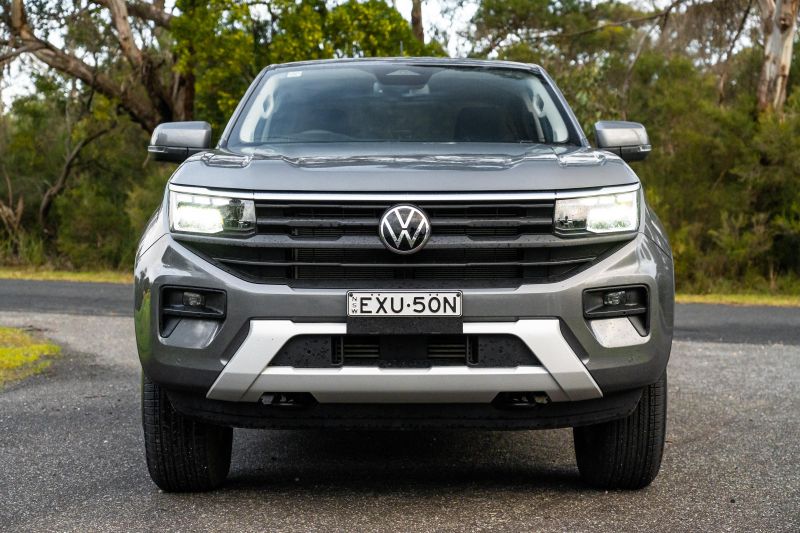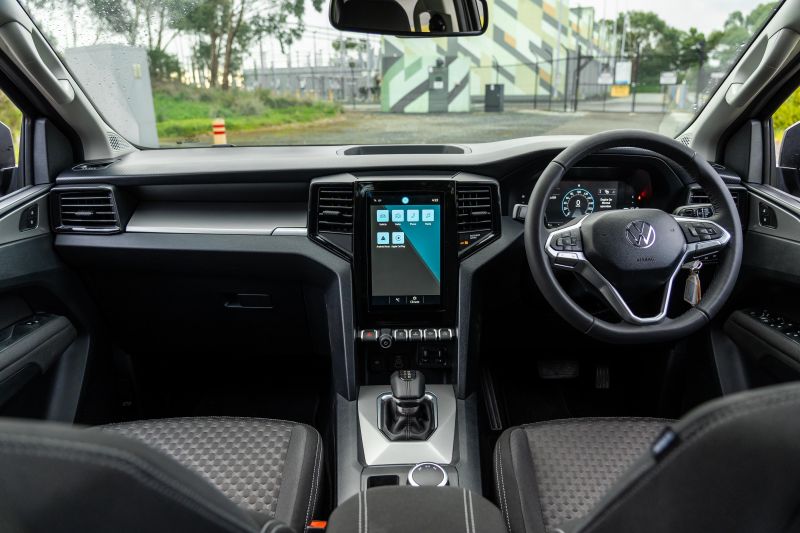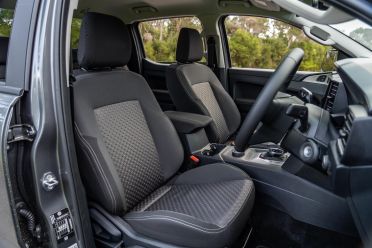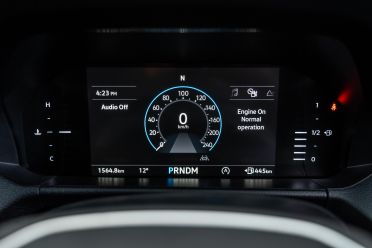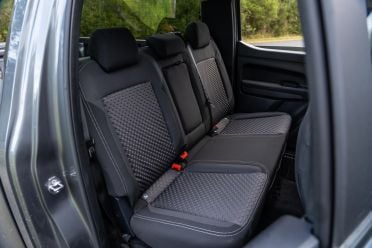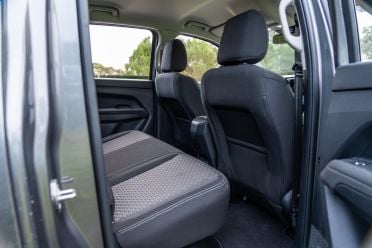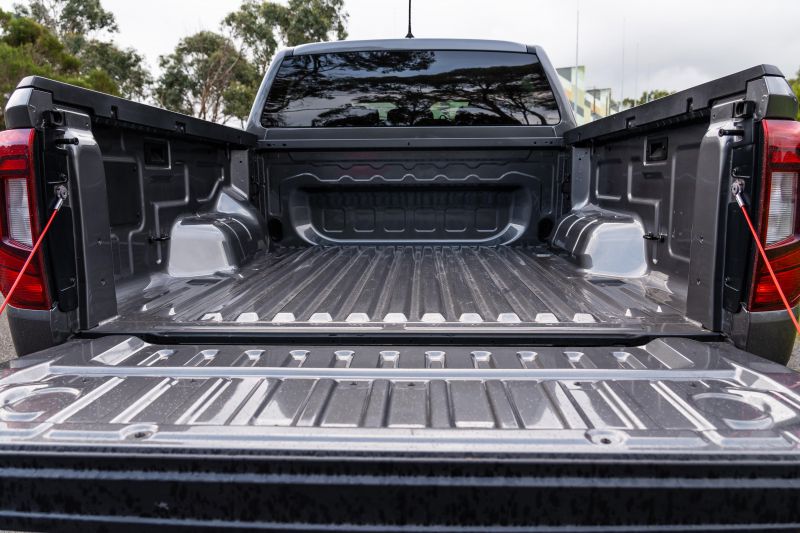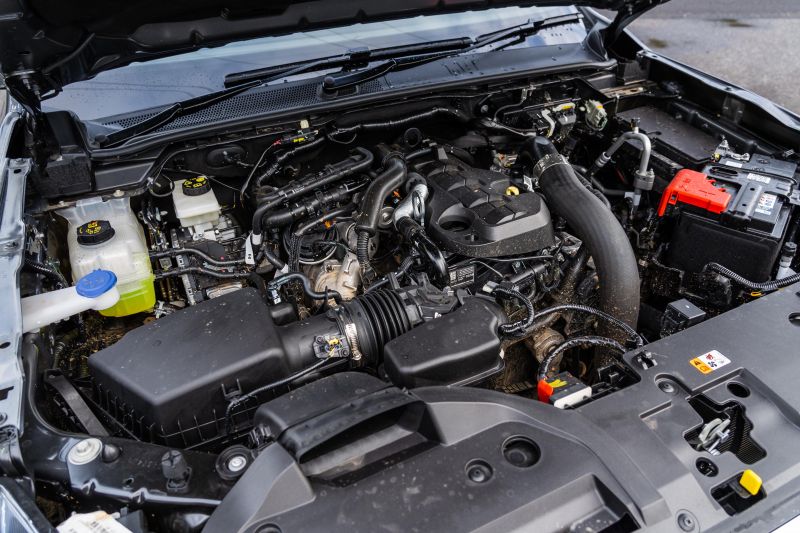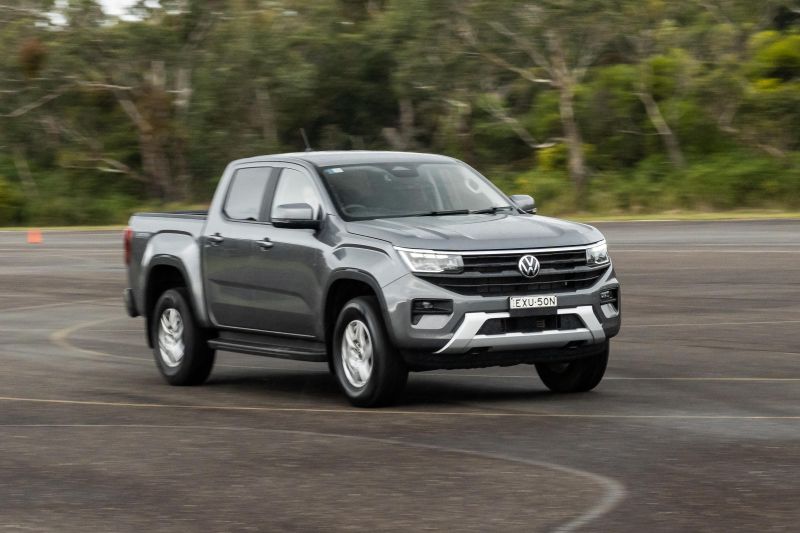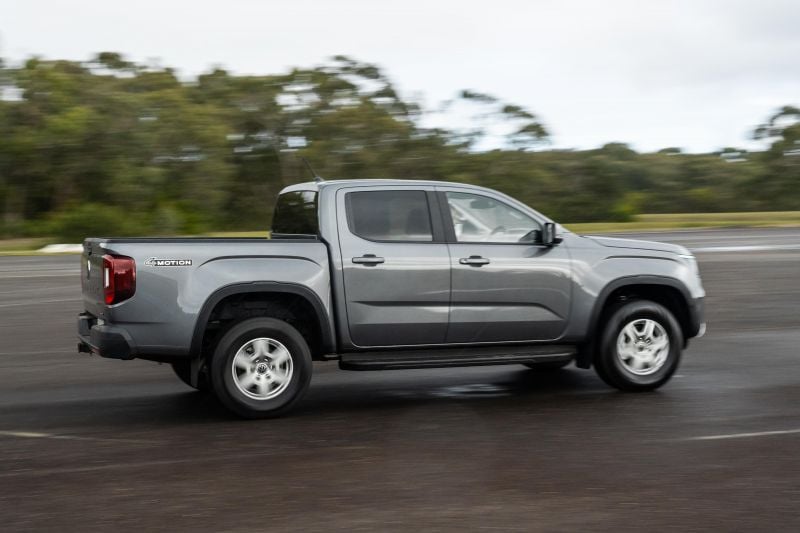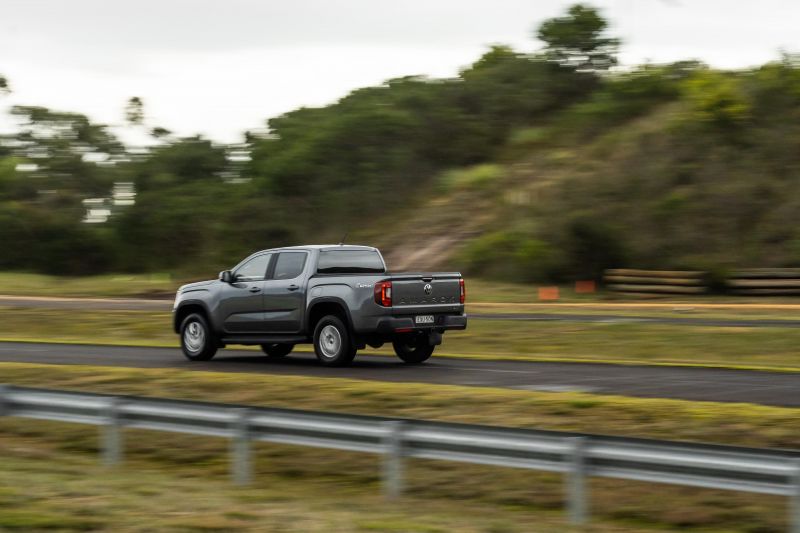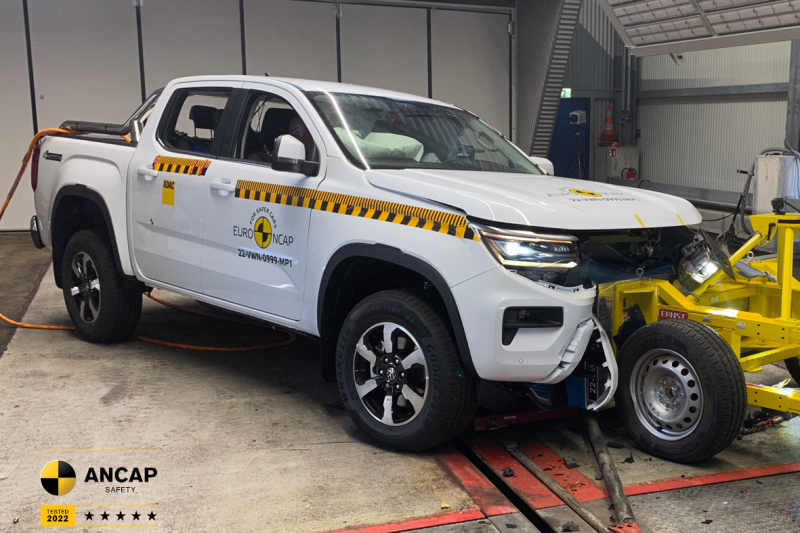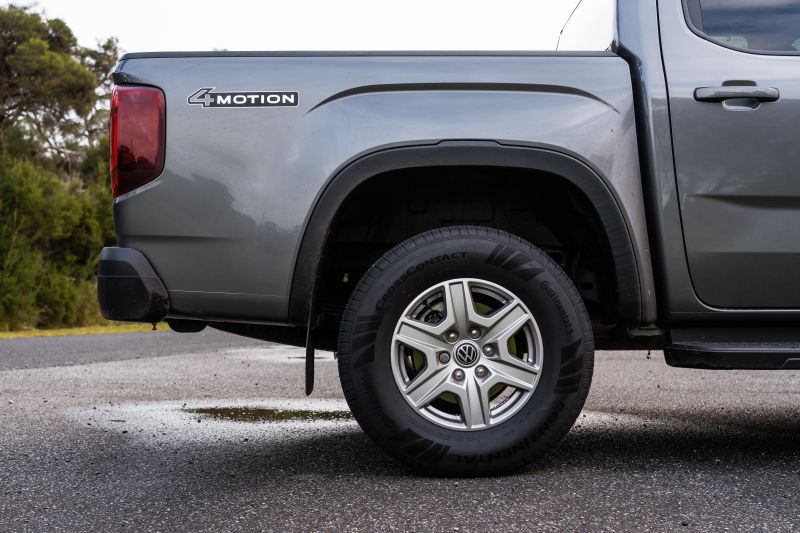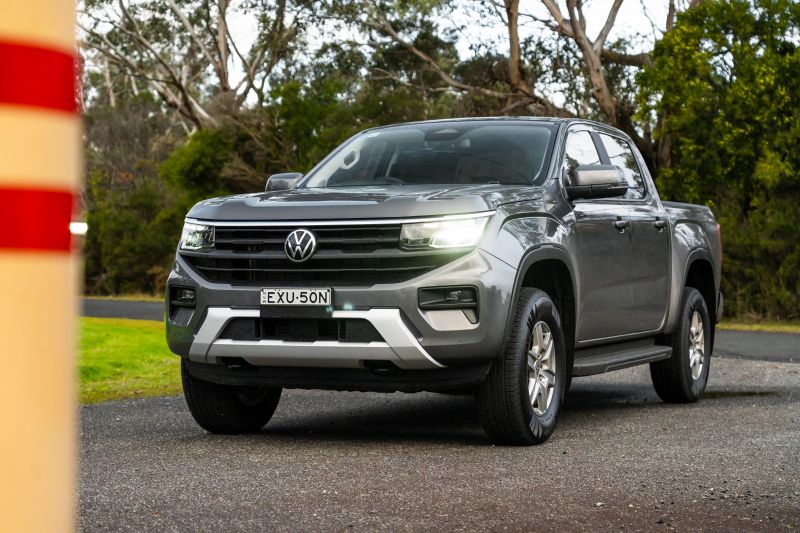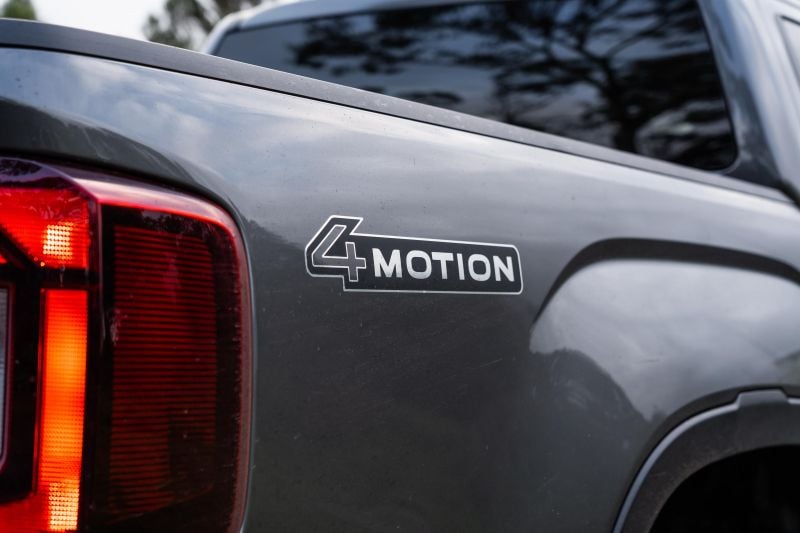The new Volkswagen Amarok is being pitched as a more luxurious refined ute than its predecessors, with an interior that’s more Touareg than Tradie, and the option of a punchy turbocharged petrol engine at the top end of the range.
But not everyone has $80,000 to spend on a dual-cab pickup, and not everyone needs their work truck, or their apprentice’s work truck, to be a leather-lined SUV with a tray.
That’s where the Amarok Life comes in. It’s not the cheapest model in the Amarok range but it’s the cheapest that features the TDI500 bi-turbo four-cylinder diesel engine.
It also does away with the fleet-spec black bumpers of the base model and replaces the vinyl seats with friendlier cloth. It also picks up a full suite of active safety features.
In other words, it’s the Amarok aimed at regular buyers on a budget, rather than fleet controllers. How does it stack up in the real world?
How does the Volkswagen Amarok fare vs its competitors?
View a detailed breakdown of the Volkswagen Amarok against similarly sized vehicles.

Volkswagen
Amarok
How much does the Volkswagen Amarok Life TDI500 cost?
The Volkswagen Amarok range kicks off at $52,990 before on-roads, and immediately jumps by $4000 to the Life TDI500 ($56,990) on test here.
It goes head-to-head with the Ford Ranger XLS and XLT ($54,930 and $62,490 respectively), along with the Isuzu D-Max X-Rider ($58,000) and Mazda BT-50 XTR ($56,630).
2023 Volkswagen Amarok pricing:
- Volkswagen Amarok Core TDI405 4Motion 6-speed auto: $52,990
- Volkswagen Amarok Life TDI500 4Motion 10-speed auto: $56,990
- Volkswagen Amarok Style
- 2.0 TDI500 4Motion 10-speed auto: $66,990
- 3.0 TDI600 4Motion 10-speed auto: $70,990
- Volkswagen Amarok PanAmericana 3.0 TDI600 10-speed auto: $75,990
- Volkswagen Amarok Aventura
- 3.0 TDI600 4Motion 10-speed auto: $79,990
- 2.3 TSI452 4Motion 10-speed auto: $79,990
Prices exclude on-road costs
What is the Volkswagen Amarok Life TDI500 like on the inside?
The bones of the Amarok interior are the same regardless of which model you opt for, but the Life loses a lot of the luxuries offered further up the range.
Front passengers sit in cloth-trimmed seats with manual adjustment, and the central touchscreen is a 10-inch unit rather than the 12-inch unit on the Style. Likewise the 8.0-inch driver display is smaller than the 12-inch setup in the model above.
However, if you can look past the cheaper finishes the fundamentals are still solid. The driving position is excellent and most of what you need to poke or prod is within easy reach. The steering wheel extends out to meet taller drivers, and the touchscreen doesn’t require too much stretching.
Speaking of the infotainment, it’s mostly good. It starts fast, has crisp graphics and identifiable fonts, and has wireless phone mirroring – but falls into some of the traps afflicting other Volkswagen Group products.
There are no dials for the climate control, for example, so you need to take your eyes off the road and prod the screen twice to change the temperature, and there are lots of sub-menus when you start diving into the driver assistance screens.
In the old days, basic utes would’ve had sliders or basic knobs with a vague blue or red line to control the temperature in the absence of climate control. In 2023, the solution Volkswagen offers is still a slider with no temperature readout… but it’s buried in the touchscreen.
If you want to change the blower speed or the air distribution that’s also built into the touchscreen – but a different section.
Why are we spending so much time complaining about the air-con controls? Because new cars are meant to make things easier for owners, and the software in the new Amarok makes something basic much harder.
Storage spaces abound up front. There are cupholders on the transmission tunnel, a phone-sized space under the dash, and a deep central bin – although the trailer brake controller does make it harder to put a phone in that space.
It also means the USB-A and USB-C ports are recessed to the point of being hard to reach.
The solution for phones/trailer brake controllers in the closely related Ford Ranger is better thought out.
As for the rear seats? They’re a meaningful improvement on what was on offer in the last Amarok, which Volkswagen says was a key priority when developing the second-generation car.
Legroom and headroom are improved; although, they’re par for the class rather than standout. The elevated rear bench will do wonders if your kids are prone to carsickness, and the inclusion of air vents will no doubt be welcome during hot Australian summers.
ISOFIX points feature on the outboard rear seats, and there’s a trio of top-tether points for child seats. There are no rear USB ports, however.
It’s also worth noting that, as is the case in most dual-cab utes, accessing the top-tether points behind the rear bench can be hard work.
If you’re installing a car seat once and leaving it there it’s not a huge hardship, but it’s worth keeping in mind if you frequently shuffle a seat between vehicles.
The tray still features space for a pallet between the arches, and has up to six tie-down points. Bare metal, a plastic tub liner, and a spray-in bed liner are offered depending on the model; our Life tester had a bare metal tray.
The tailgate features a torsion bar, making it easier to open than it otherwise would’ve been.
What’s under the bonnet?
The TDI500 has a 2.0-litre bi-turbo four-cylinder turbo-diesel making 154kW of power and 500Nm of torque, mated with a 10-speed automatic transmission and selectable four-wheel drive.
That means you have 2H (or rear-wheel drive) for on-road driving, and 4H (high range) and 4L (low range) for off-road use. Only V6 models have a full-time four-wheel drive system with 4A mode for driving on sealed surfaces.
Claimed fuel economy is 7.2L/100km on the combined cycle. The Amarok has an 80-litre fuel tank, and doesn’t require AdBlue.
How does the Volkswagen Amarok Life TDI500 drive?
Volkswagen offers two distinct flavours of Amarok – the basic Core, Life, and Style feature twin-tube dampers aimed at delivering a more comfortable ride, where higher-end models have a sportier setup which bring the last Amarok to mind.
Given most owners will be driving their utes with a family on board or a load in the back, the fact this low-end model doesn’t feel as “sporty” as the PanAmericana or Aventura isn’t really a problem.
By ute standards it does a good job keeping pimply city streets at bay, although there is a bit of bouncing at the rear axle over speed bumps when the tray is empty. That’s not unusual for a ute designed to carry a tonne in the tray.
The last Amarok had quite a heavy, direct steering rack. The new model has lighter steering that makes it wieldy at low speeds, despite having a longer wheelbase and body than the car it replaces.
Dual-cab utes are fast becoming family cars instead of work vehicles, and the lighter controls are in keeping with that switch. They make this big beast more approachable for people hopping out of a Tiguan and into a ute, although some previous-generation owners will no doubt miss the meatier feeling from their trucks.
It’s down on power and torque compared to the V6, but the bi-turbo TDI500 engine is far from a poor relation. As we’ve found in the Ranger, it’s a refined and torquey companion.
There’s a hint of diesel clatter on a cold start, but once it’s warm the engine is nice and quiet at low speed.
The 10-speed automatic is generally unobtrusive, shuffling quietly through the gears in day-to-day driving. It’s more decisive than the unit in the last Ranger, but when you put your foot down it sometimes needs to change down one, two, three or four gears, which can make it feel a bit unsure of itself.
In our experience, the Bi-Turbo punches above its weight if you’re towing, and it feels punchier than you’d expect on the highway. You might want a V6, but you don’t necessarily need it…
You’re still aware it’s a commercial vehicle with no load in the back (no great surprise) at highway speeds, but you don’t get the sense the tail is wagging the dog when you hit bumps at speed, and occupants aren’t jiggled relentlessly.
The broader suite of active driver assists is welcome. Adaptive cruise control is smooth and smart and the active lane-keeping assist is confident – without feeling like it’s trying to wrestle the wheel from your hand.
Combined with a quiet, refined cabin at highway speeds, the assists make the new Amarok a very capable cruiser.
What do you get?
Amarok Core highlights:
- Exterior
- 17-inch alloy wheels
- Electric folding mirrors
- LED headlights
- Tow bar with trailer brake controller
- Locking tailgate
- Mud flaps
- Cargo bed lighting and tie-downs
- Interior
- Fabric seats
- Vinyl floors
- Single-zone air-conditioning
- 10-inch portrait touchscreen
- Apple CarPlay and Android Auto
- Digital radio
- Wireless phone charging
Amarok Life adds:
- Exterior
- Body-colour bumpers, mirrors, door handles
- LED fog lights
- Heated side mirrors with puddle lamps
- Locking wheel nuts
- Remote locking tailgate
- Interior
- Unique seat trim
- 6-speaker stereo
- Privacy glass
- Leather-wrapped shifter, steering wheel
- Carpet flooring and mats
- Auto-dimming rear mirror
- Other
- Electronic park brake
- Front tow hooks
- Rain-sensing wipers
- Automatic headlights
Is the Volkswagen Amarok Life TDI500 safe?
The Amarok has a five-star ANCAP safety rating based on testing carried out by Euro NCAP in 2023.
It scored 86 per cent for adult occupant protection, 93 per cent for child occupant protection, 74 per cent for vulnerable road user protection and 83 per cent for safety assist.
The adult occupant protection score for the Amarok is technically higher than what the Ranger received, with the Ford receiving a score of 84 per cent. The Amarok fared better overall in whiplash protection.
Standard safety equipment includes:
- 9 airbags
- Autonomous emergency braking
- Adaptive cruise control
- Lane-keep assist
- Speed sign recognition
- Multi-collision braking
- Reversing camera
- Rear parking sensors
Amarok Life adds:
How much does the Volkswagen Amarok TDI500 Life cost to run?
The Amarok is backed by a five-year, unlimited-kilometre warranty like the wider Volkswagen range.
Maintenance is required every 12 months or 15,000 kilometres. The Amarok will cost $1800 to service for five years or 75,000 kilometres with one of its prepaid Care Plans. This undercuts the price of the equivalent package for a 2022 four-cylinder diesel by $200, and a 2022 turbo-diesel V6 by $400.
Those who don’t opt for a Care Plan on the new Amarok will pay $329 for the first, second, and fourth service, $414 for the third service, and $400 for the fifth. This is equivalent to the same price over five years, but paid for at the time of service rather than being bundled into the car’s purchase price.
CarExpert’s Take on the Volkswagen Amarok Life TDI500
If you’re after an Amarok on a budget, we’d be picking the Life over the base Amarok Core.
Beyond its more powerful four-cylinder engine, it brings a suite of features that make it easier to live with day-to-day.
From extra active safety equipment to the more comfortable interior, to the remote locking tailgate, the extra $4000 spend is absolutely justified.
Buyers on a budget should also consider the long list of rivals out there for the Life, though. You can get more equipment for less money in a Mitsubishi Triton or GWM Ute Cannon, for example.
But what it lacks in luxuries, it makes up for with capability. If that’s your priority, the Life is well worth a look.
Click the images to view the full gallery

